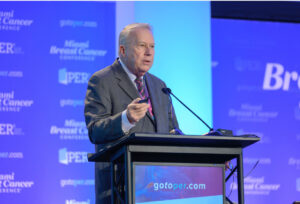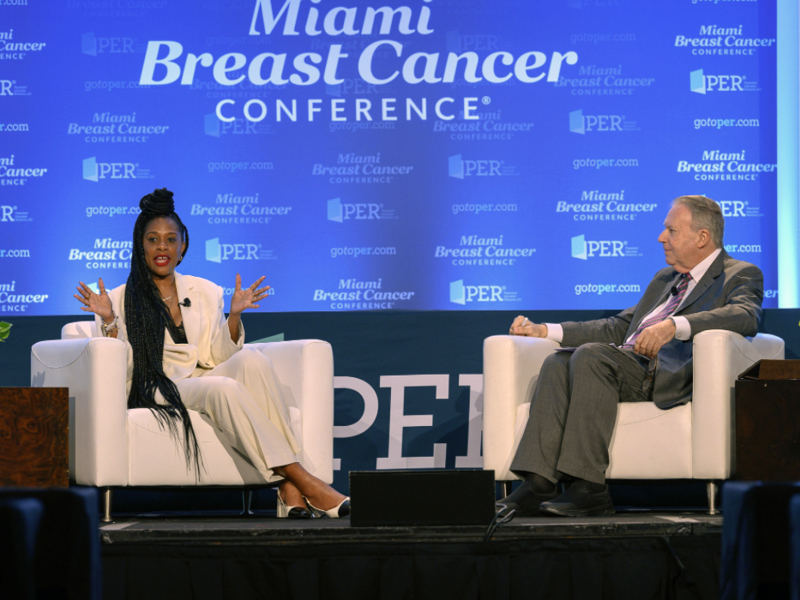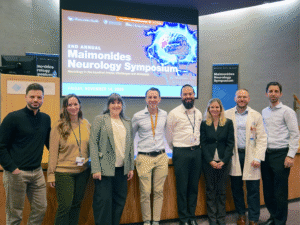Breast cancer accounts for roughly 30% of all new female cancers* diagnosed every year, so the need to develop new therapies and identify better treatment protocols is top of mind for breast cancer care providers. Maimonides Health is at the forefront of these efforts.
As the only fully accredited breast center in Brooklyn, Maimonides offers the most advanced diagnostic techniques and multidisciplinary treatments. Our providers’ expertise has also positioned the center as a leader at the Miami Breast Cancer Conference, the specialty’s top annual symposium.
Maimonides at the Miami Breast Cancer Conference
Since its inception in 1983, the Miami Breast Cancer Conference has been a gathering spot for breast cancer experts across disciplines. Surgeons, radiation oncologists, geneticists, pathologists, radiologists, and medical care specialists come together to share their expert clinical knowledge and innovative research.
 For the past 11 years, Patrick Borgen, MD, Chair of Maimonides’ Department of Surgery and Director of the Maimonides Breast Center, has served as the conference’s program chair.
For the past 11 years, Patrick Borgen, MD, Chair of Maimonides’ Department of Surgery and Director of the Maimonides Breast Center, has served as the conference’s program chair.
“The Miami Breast Cancer Conference is incredibly important to our field as we work to raise the standard of care for all patients affected by these complex diseases,” says Dr. Borgen. “It was an honor for me to return as chair this year to facilitate the exchange of ideas as we confronted the most pressing challenges to the clinical treatment of and investigations into breast cancer.”
In addition to Dr. Borgen’s hand at the helm, several Maimonides providers presented their clinical knowledge and research work during the event.
Leading-edge Breast Cancer Research
This year, Maimonides providers showcased work that touched on pain management, digital innovations, targeted breast cancer treatments, and the financial implications of breast cancer.
Non-opioid pain management: During an interactive session, Dr. Borgen; Maimonides breast surgeon Joshua Feinberg, MD; and Gary Schwartz, MD, an interventional pain management specialist affiliated with Maimonides Medical Center, led a discussion about the unique challenges of managing perioperative pain. The session explored methods for proactively managing breast cancer surgery-related pain and highlighted ways to address the adverse events that can occur with opioid and non-opioid pain management protocols.
After the session, participants were armed with skills to:
- Examine the clinical implications of using opioids to control perioperative and postoperative pain
- Leverage clinical insights to create collaborative, multidisciplinary pain management protocols
- Explain the effectiveness of preemptive multimodal pain control and the impact on outcomes
- Employ pain management protocols to improve postsurgical care
“This session shed light on the multidisciplinary approach to pain management for our breast cancer patients,” said Dr. Feinberg. “We discussed our Enhanced Recovery After Surgery (ERAS) program and highlighted that the development of a patient’s pain management plan begins early in the pre-operative setting, often during the initial office visits.”
Digital innovations: Breast cancer survivors are living longer, and many need multidisciplinary care. To meet these needs, healthcare facilities must embrace the digital tools necessary to stay at the forefront of oncology care. These tools help facilities improve communication, coordination, data sharing, and decision-making. Using them leads to better patient-centered care.
During a session on digital innovations, Dr. Borgen and Dr. Feinberg shared their first-hand experiences using these tools at Maimonides.
 “As our understanding of breast cancer improves, our armamentarium of treatment options is growing rapidly, and the correct sequencing of treatment is critical to providing the best care,” said Dr. Feinberg. “Here at Maimonides, we select digital tools that assist us in this mission. For example, in weekly tumor board conferences in all of oncology sub-specialties, we use a cloud-based platform that creates a visual timeline of a patient’s treatment course, thereby enabling doctors to track a patient’s clinical course and intervene in real-time as new treatments become available.”
“As our understanding of breast cancer improves, our armamentarium of treatment options is growing rapidly, and the correct sequencing of treatment is critical to providing the best care,” said Dr. Feinberg. “Here at Maimonides, we select digital tools that assist us in this mission. For example, in weekly tumor board conferences in all of oncology sub-specialties, we use a cloud-based platform that creates a visual timeline of a patient’s treatment course, thereby enabling doctors to track a patient’s clinical course and intervene in real-time as new treatments become available.”
Triple-negative breast cancer treatment: Black women are disproportionately diagnosed with more advanced-stage triple-negative breast cancer (TNBC). In July 2021, the Food & Drug Administration approved the use of neoadjuvant chemotherapy (NACT) and the immunotherapy drug pembrolizumab to attack TNBC. Existing research (the KEYNOTE-522 trial) shows this combination shrinks tumors and lymph nodes to nearly eradicate breast cancer. However, the KEYNOTE-522 did not collect race as a baseline demographic characteristic.
To determine whether this therapy works equally well across races, Maimonides breast surgery fellow Mukuhi Ng’ang’a, MD, conducted a retrospective study with a racially diverse group of 29 women with TNBC. Her results revealed that most patients tolerated the NACT-pembrolizumab combination therapy well with few side effects. Additional data collection is in progress and future analysis will provide insight into a potential correlation between race and therapy response.
Financial toxicity: Financial toxicity is the direct and indirect out-of-pocket cost associated with a patient’s breast cancer care. It may affect low-income patients or individuals in minority groups most. Existing research shows financial toxicity is strongly linked to quality of life and may predict patient survival.
Dr. Feinberg and Jonathan Klein, MD, MSc, radiation oncologist at Maimonides, are conducting a longitudinal, non-interventional study** to learn more about the impact of financial toxicity. This trial will use self-reported patient insights to evaluate how patients feel about financial toxicity throughout their breast cancer treatment.
Patients will complete a questionnaire during their first visit with a surgeon and another six months later. They may choose to complete additional questionnaires at 3, 9, and 12 months. Dr. Feinberg and his colleagues hypothesize that patient-reported financial toxicity will worsen during the first six months of treatment. To date, 10 out of 123 anticipated patients have enrolled.
“With over 45% of Maimonides patients either having Medicaid or no insurance, financial toxicity poses a significant challenge in our patient population,” said Dr. Feinberg. “This study aims to examine how both direct costs of care and indirect costs such as transportation, child care, or lost income can affect treatment efficacy and, ultimately, patient survival, so we can start to address financial toxicity and improve outcomes.”
Maimonides Cancer Center and our breast cancer specialists provide leading-edge, comprehensive breast cancer care. Learn more about our Breast Center and research or call (718) 765-2550 to refer a patient.
*https://www.cancer.org/cancer/types/breast-cancer/about/how-common-is-breast-cancer.html
**https://www.cancernetwork.com/view/58-prospective-longitudinal-assessment-of-financial-toxicity-among-breast-cancer-patients




